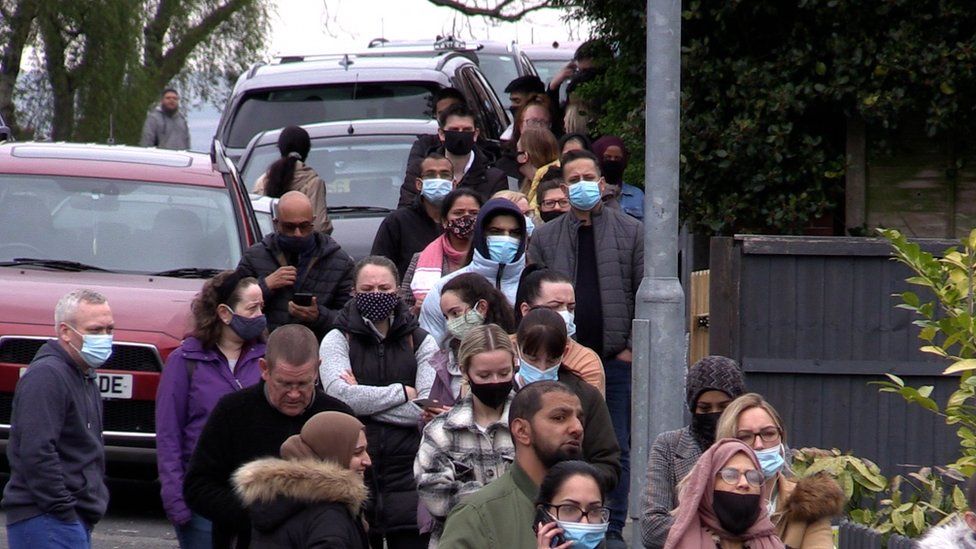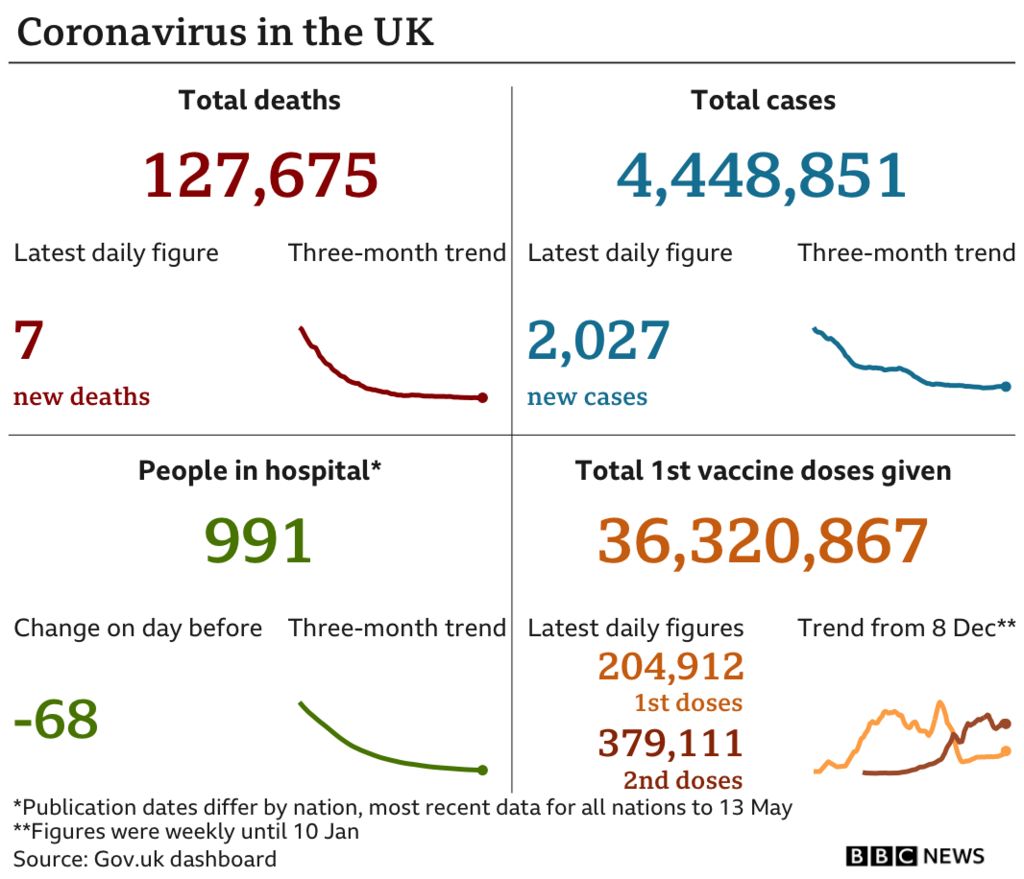
No 10 has defended its decision not to ban travel from India sooner, amid concern that the coronavirus variant first discovered there is now spreading quickly in parts of the UK.
India was reporting more than 100,000 cases a day by 5 April, but was not added to the red list until 23 April.
The government said the UK has "some of the toughest border measures".
It comes after the British Medical Association raised concerns about Monday's relaxation of Covid rules.
Prime Minister Boris Johnson said on Friday that the B.1.617.2 Indian variant could pose "serious disruption" to the final stage of lockdown easing in England on 21 June - but insisted Monday's easing would go ahead as planned.
Scientists advising the government are confident the Indian variant spreads more easily, with cases of it nearly tripling to 1,313 in the past week in England.
Asked why the borders were not closed sooner, a government spokesman told the BBC: "We took precautionary action to ban travel from India on 23 April, six days before this variant was put under investigation and two weeks before it was labelled as of concern.
"Prior to India being placed on the red list in April anyone coming to the UK had to test negative and quarantine for 10 days."
By the time the travel ban came into force, daily Covid cases in India had risen above 330,000.
Surge testing is now taking place in targeted areas across England where virus variants have been found, including postcodes within several London boroughs, Sefton, Worcestershire, and Nottingham.
Despite concern about the Indian variant, coronavirus restrictions across England, Scotland and Wales are due to be relaxed from Monday.
Which rules are easing varies across the devolved nations, but there will be a greater degree of indoor mixing allowed and more hospitality venues will be able to reopen.
Northern Ireland is due to review its restrictions later this month.
On Saturday, the British Medical Association said it had serious concerns about the decision to continue with the easing of lockdown restrictions.
"It is a real worry that when further measures lift on 17 May, the majority of younger people, who are often highly socially mobile and could therefore be most at risk of a more infectious strain, are not yet vaccinated," said the BMA's Dr Richard Jarvis.


Tomorrow in England, and on time, is step three of the government's easing of coronavirus restrictions - the reopening of indoor hospitality and entertainment venues, the reopening of our homes to friends, the lifting of most social contact rules outside, the return of hugs.
But the prospect of all of this collides with huge questions about the so-called Indian variant, and just how easily it is spread.
Some of the government's scientific advisers fret that its potential transmissibility, coupled with a lot more socialising, could have grave consequences, although it's acknowledged much is still unknown; the data is partial.
But ministers are keen to push back on claims they acted too late in restricting travel from India, pointing out that it was six days after the country was put on the red list that the variant now causing alarm was first put under investigation and a week after that before it was labelled a "variant of concern".
A spokesman said the decision to add countries to the red list was based on what they called "extensive consideration of the type of cases that are imported, rather than the amount".

Health minister Edward Argar told the BBC on Saturday there had been a "minor increase" in hospital presentations in Bolton - one of the areas where the Indian variant is spreading - mainly among unvaccinated 35-65 year olds.
And Prof Anthony Harnden, who advises the government on vaccinations, said there were still "lots of unvaccinated people in at-risk groups" in the affected areas.
"The worry is that those unvaccinated vulnerable individuals, those over-50, unvaccinated, will develop Covid from this more transmissible [variant] and end up in hospital," he said.
In Scotland, First Minister Nicola Sturgeon said initial research suggested an outbreak in the south side of Glasgow was being driven by the Indian variant - as she delayed the easing of restrictions there and in Moray.

Which rules are changing on Monday?
In England, six people or two households can meet indoors, with pubs, restaurants and cafes allowed to serve customers inside. Up to 30 people can meet outdoors. Museums, cinemas, theatres and sports stadiums can reopen, and indoor exercises resume. People can travel abroad to green list countries without needing to quarantine when they return.
Up to six people from a maximum of three households can socialise indoors in Scotland, and entertainment venues such as cinemas, theatres and bingo halls can reopen. Alcohol can be served indoors in hospitality venues until 22:30, and international travel will be allowed in line with England's rules.
In Wales, pubs, cafes, bars and restaurants reopen for indoor service, with groups of up to six from six households permitted to meet. All holiday accommodation can reopen fully, as can indoor visitor attractions, such as galleries and museums. International travel can resume in line with the traffic light system.
Northern Ireland is reviewing its restrictions on 20 May, with the hope more restrictions will be lifted on 24 May.



- LOOK-UP TOOL: How many cases in your area?
- SYMPTOMS: What are they and how to guard against them?
- YOUR QUESTIONS: We answer your queries
- EPIDEMIC v PANDEMIC: What's the difference?

Meanwhile, there has been a "surge" in vaccination bookings in England ahead of the rule changes, according to the NHS, with more than 600,000 people booking appointments in the past two days.
NHS England's medical director, Prof Stephen Powis, praised the vaccine rollout, and added: "Getting the vaccine is the single most important step we can take to protect ourselves, our families and our communities against Covid-19."
The rise in bookings comes after it was announced that those in their late 30s with no underlying health conditions can now book their jabs in England.
Rules on who is offered a vaccine and when differ across the UK, with some people in their 20s already getting their first jab in Wales.

- ALI PLUMB'S FAVOURITE MOVIES: 15 of the best films to watch on a rainy Sunday
- MUSIC NOSTALGIA: Revisit all the best Number 1 singles from the charts

https://news.google.com/__i/rss/rd/articles/CBMiJmh0dHBzOi8vd3d3LmJiYy5jby51ay9uZXdzL3VrLTU3MTMxNDEw0gEqaHR0cHM6Ly93d3cuYmJjLmNvLnVrL25ld3MvdWstNTcxMzE0MTAuYW1w?oc=5
2021-05-16 03:43:04Z
CBMiJmh0dHBzOi8vd3d3LmJiYy5jby51ay9uZXdzL3VrLTU3MTMxNDEw0gEqaHR0cHM6Ly93d3cuYmJjLmNvLnVrL25ld3MvdWstNTcxMzE0MTAuYW1w
Tidak ada komentar:
Posting Komentar